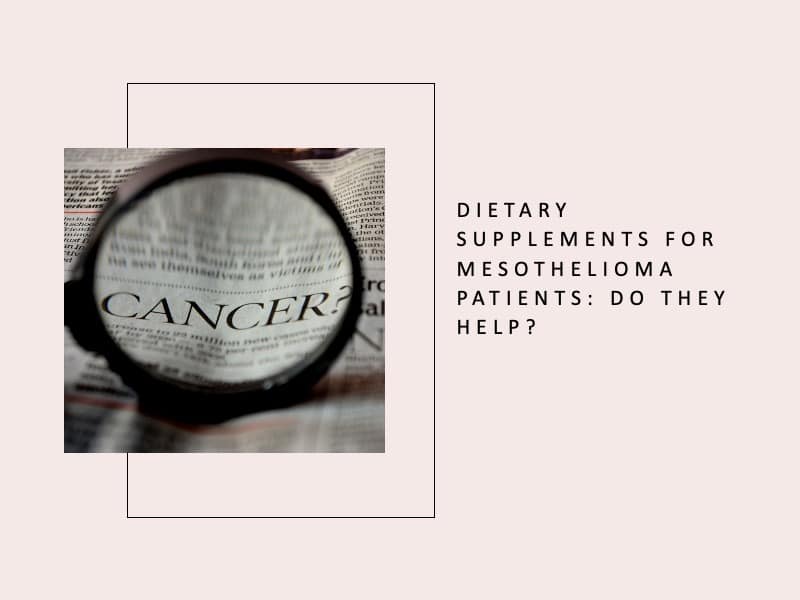Dietary Supplements for Mesothelioma Patients: Do They Help?
For mesothelioma patients, supplements for mesothelioma can help address deficiencies, support the immune system, and improve quality of life.
Mesothelioma is a rare and aggressive cancer caused by asbestos exposure, often leaving patients with severe health challenges. In addition to symptoms like fatigue, chest pain, and breathing difficulties, treatments such as chemotherapy, radiation, and surgery can further deplete the body’s nutrient stores, hindering recovery.
While the right supplements for mesothelioma offer significant benefits, they must be used cautiously. Improper supplementation for mesothelioma patients can interfere with treatments or lead to unwanted side effects.
A balanced, evidence-based approach, guided by healthcare professionals, is essential for optimizing outcomes and supporting long-term health.
Key Supplements for Mesothelioma Patients
Mesothelioma treatments, such as chemotherapy and radiation, often take a toll on the body, leading to fatigue, nutrient deficiencies, and reduced immune function.
For many mesothelioma survivors, targeted supplementation can help bridge nutritional gaps, support recovery, and improve overall well-being.
However, not all supplements are created equal, and their benefits depend on individual needs and careful integration into treatment plans. Exploring the most effective vitamins, minerals, and other supplements can provide a foundation for better health outcomes.
Vitamins and Minerals
The depletion of key vitamins and minerals is a frequent side effect of mesothelioma treatments, leaving patients vulnerable to fatigue, weakened immunity, and slower recovery.
While dietary supplements can address these deficiencies, it’s crucial to focus on evidence-based choices.
- Vitamins A, B12, D, and E: These vitamins contribute to immune health, cellular repair, and energy production.
- Magnesium, Calcium, and Zinc: These minerals are essential for maintaining bone health, nerve function, and overall vitality during challenging treatments.
Although these nutrients are beneficial, relying solely on supplements without addressing dietary habits can limit their effectiveness. A tailored approach is key.
Vitamin D
Vitamin D has gained attention for its role in enhancing chemotherapy efficacy and supporting overall health. However, its impact on cancer outcomes remains an area of ongoing research, highlighting the need for cautious optimism.
Emerging studies suggest that vitamin D may improve the effectiveness of chemotherapy drugs like pemetrexed, widely used in mesothelioma treatment. Additionally, it supports bone health and immune resilience, which are critical for patients undergoing rigorous therapies.
However, self-supplementation without professional oversight can lead to imbalances or interfere with other treatments.
Always consult a specialist before adding vitamin D to your regimen.
Antioxidants for Oxidative Stress
Cancer treatments like chemotherapy and radiation create oxidative stress, which can damage healthy cells and lead to additional complications.
Antioxidants are often promoted for their ability to reduce oxidative damage, but their use during cancer treatment remains controversial.
- Selenium and Beta-Carotene: These antioxidants may enhance immune function and protect healthy cells.
- Vitamin E: Known for its protective properties, it may help reduce side effects like nerve damage caused by chemotherapy drugs such as cisplatin.
Despite their benefits, antioxidants can potentially shield cancer cells, making them a double-edged sword. Discussing their use with a healthcare provider is essential to avoid undermining treatment efficacy.
Protein and Amino Acids
Muscle wasting, also known as cachexia, is a serious concern for mesothelioma patients, often exacerbated by the disease and its treatments.
While supplements like protein powders and branched-chain amino acids (BCAAs) promise to combat muscle loss, their effectiveness varies based on individual needs and overall health status.
- Protein powder supplements can provide a quick source of nutrition, especially for those struggling with appetite loss.
- BCAAs may help preserve muscle mass and support energy levels during recovery.
While promising, these supplements are no substitute for a balanced diet and must be used under professional guidance to avoid potential side effects or interactions.
Safety Tips & Precautions
While supplements offer promising benefits, their use is not without risks. Misguided supplementation can lead to harmful interactions with cancer treatments, reduce therapy effectiveness, or worsen side effects.
- Vitamin C and E: Although beneficial in some contexts, these antioxidants may inadvertently protect cancer cells during chemotherapy.
- St. John’s Wort: A seemingly harmless herbal remedy, this supplement can accelerate drug metabolism, reducing chemotherapy’s effectiveness.
Balancing the potential benefits and risks of supplementation requires a nuanced approach guided by oncologists and dietitians. Blindly adding supplements to your routine can do more harm than good.
No two mesothelioma patients are the same, making personalized supplementation plans critical for success. A one-size-fits-all approach often fails to address individual needs and risks, underscoring the importance of professional guidance.
Dietitians and oncologists can help patients:
- Identify deficiencies.
- Determine safe dosages.
- Select evidence-based supplements to support treatment outcomes.
By working closely with healthcare providers, patients can create a supplementation plan that optimizes their recovery without compromising treatment efficacy.
Other Dietary Interventions for Mesothelioma Patients
Supplements can fill nutritional gaps, but they should not replace the foundation of good nutrition: a balanced diet.
Increasing intake of fruits and vegetables, particularly those rich in carotenoids like carrots and tomatoes, offers a natural way to support recovery and overall health.
Research suggests that these nutrient-dense foods may help reduce cancer risks and improve outcomes for mesothelioma patients. While supplements can complement a healthy diet, whole foods provide essential phytonutrients and a synergy that no pill can replicate.
Final Thoughts: Can Dietary Supplements Help Mesothelioma Patients?
Dietary supplements can be a powerful tool for mesothelioma patients, offering critical support in addressing nutrient deficiencies, preserving muscle mass, and managing the side effects of intensive treatments.
However, their use requires careful consideration to avoid potential risks, such as harmful interactions with cancer therapies or unintended side effects.
When integrated into a comprehensive care plan that includes a balanced diet and professional guidance, supplements can enhance recovery, improve resilience, and contribute to a better quality of life.
Just as medical revolutions that changed healthcare have transformed cancer treatment, the thoughtful use of dietary supplements could further improve outcomes for mesothelioma patients.



